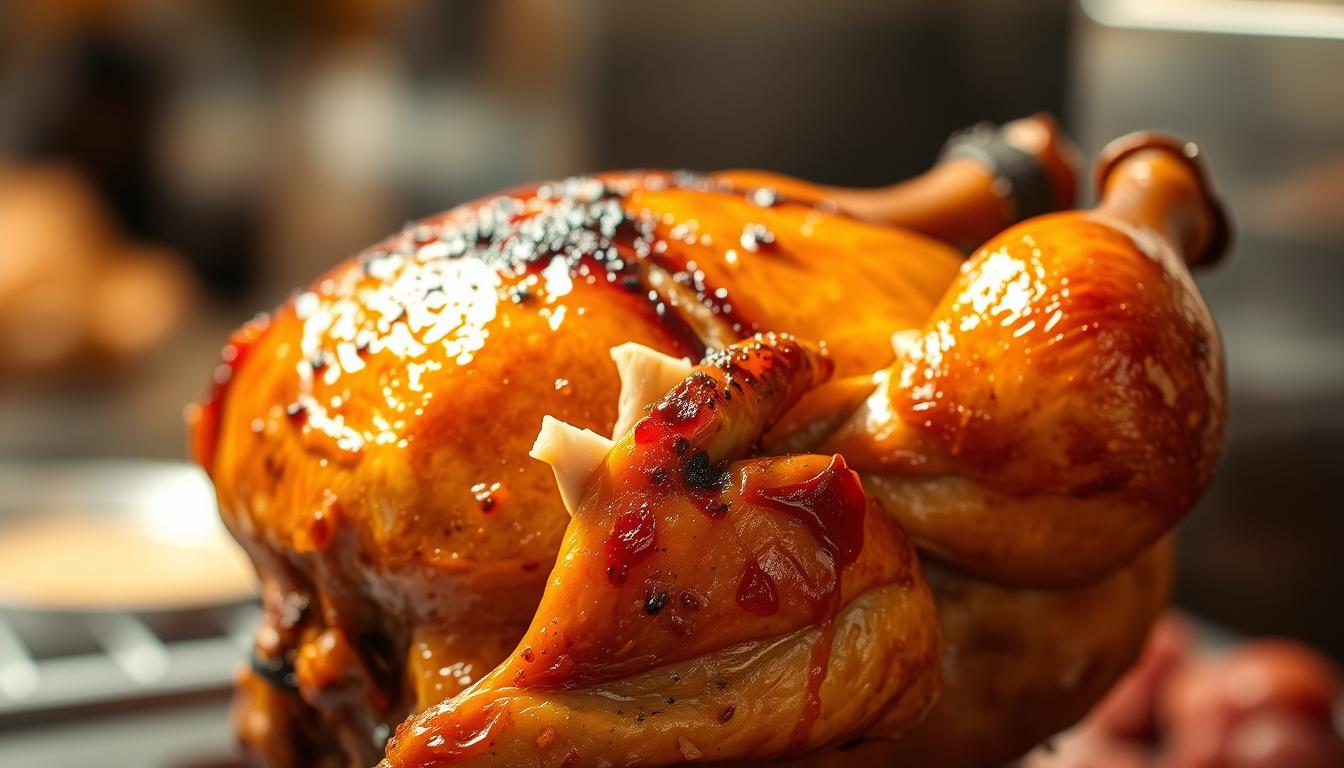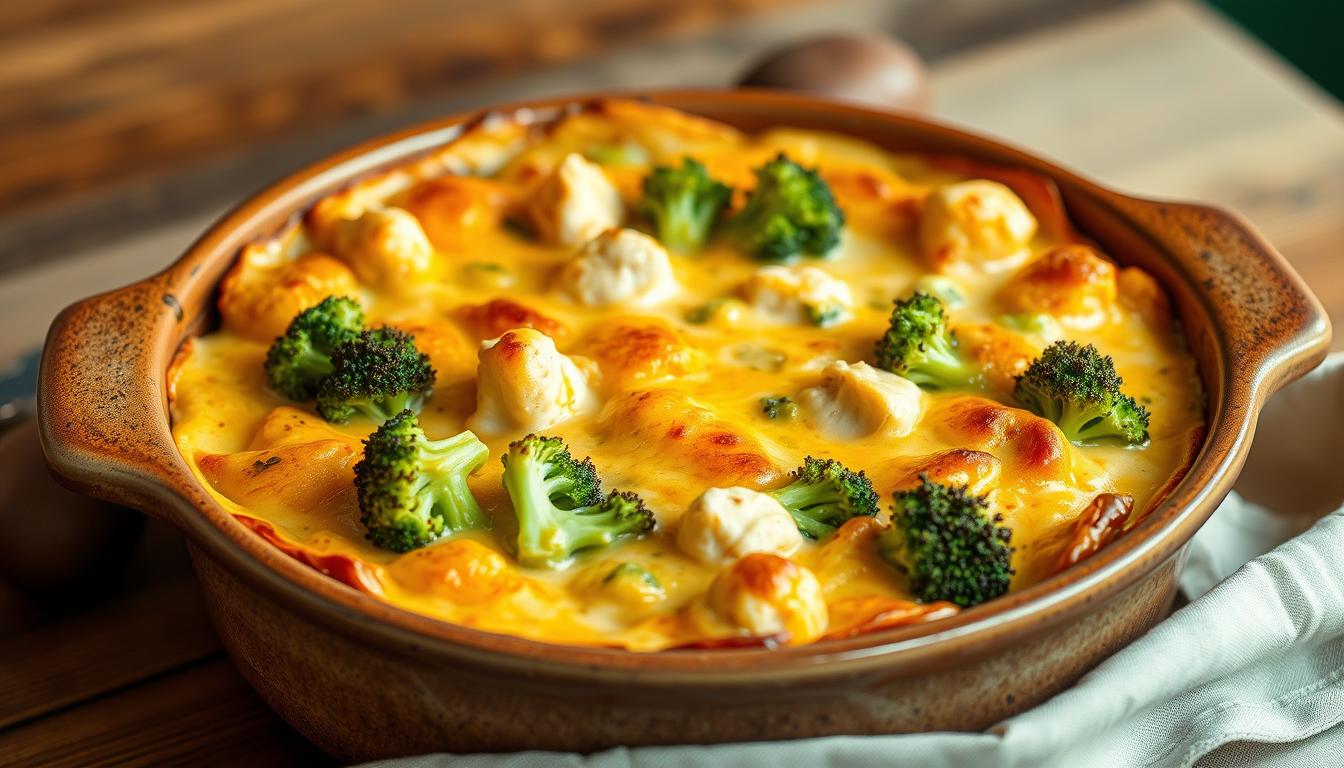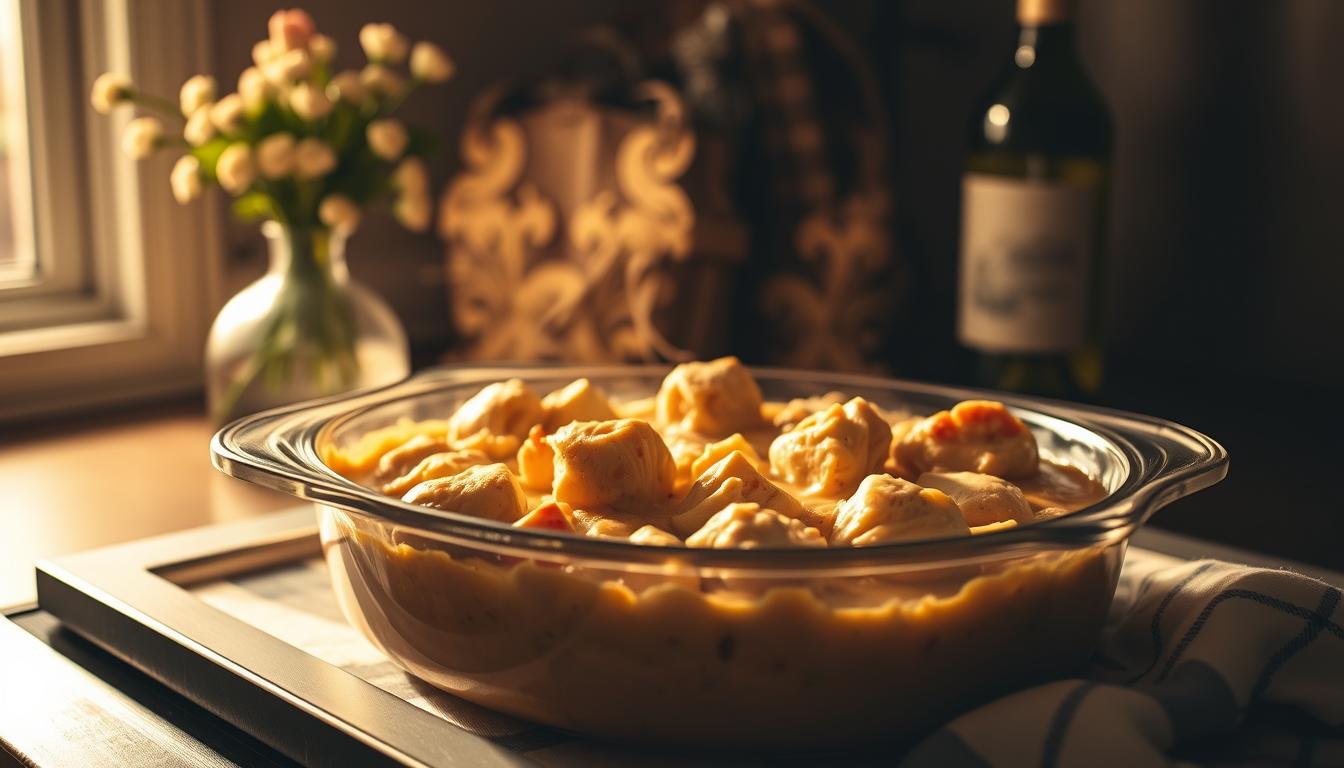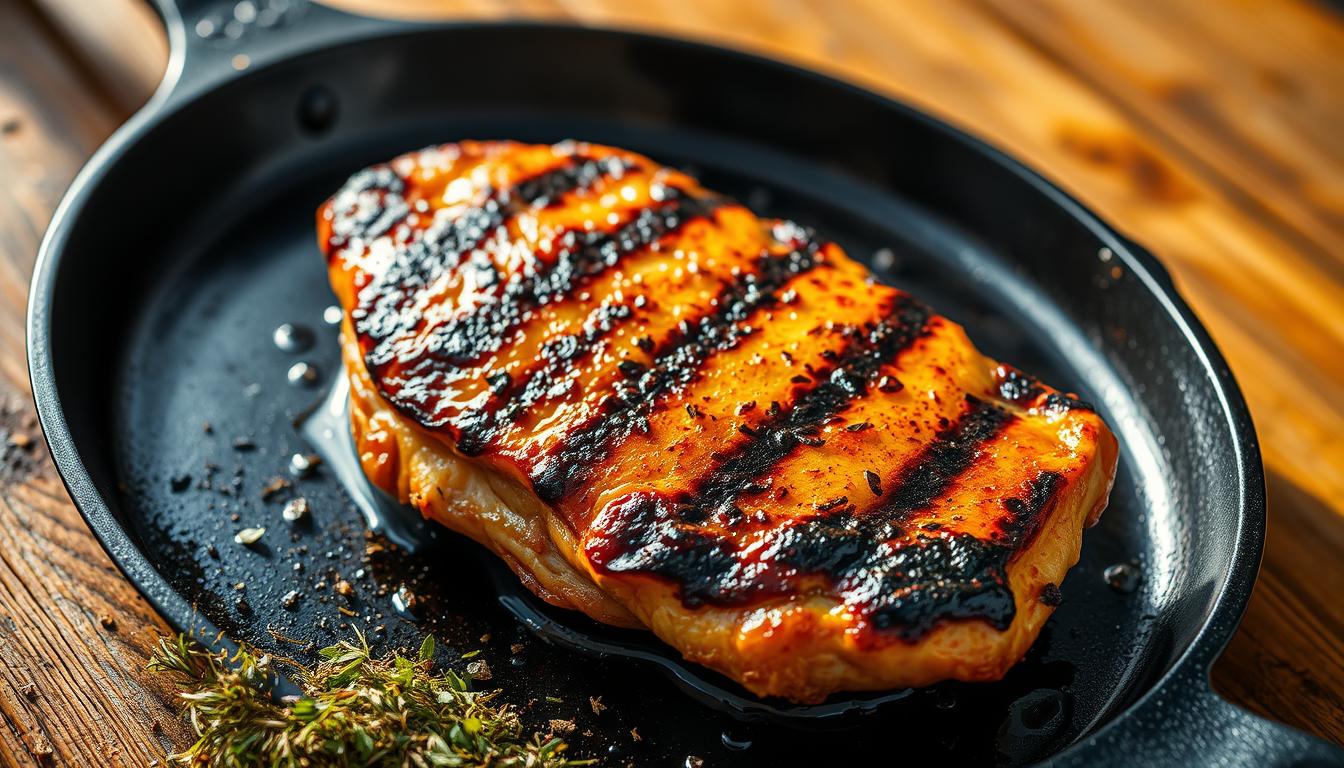Rotisserie Chicken: The Ultimate Dinner Solution
Feeling stuck on what to make for dinner? You’re not alone. Busy lives make cooking a challenge. That’s where rotisserie chicken comes in – a convenient and flavorful fix for your dinner woes.
A juicy rotisserie chicken can be the star of your meal. It’s great for many dishes, from soups to salads. It’s also perfect as a main course on its own.
Table of Contents
The Convenience and Appeal of Rotisserie Chicken
Rotisserie chicken is a favorite in many homes. It’s easy to use and fits the needs of busy families and individuals.
Why It Has Become a Household Staple
Its time-saving benefits and cost-effectiveness make it popular. It’s already cooked and seasoned, perfect for a quick, home-cooked meal.
Time-Saving Benefits for Busy Families
For families with little time, rotisserie chicken is a lifesaver. It works well in many dishes, from simple to complex.
Weeknight Dinner Shortcuts
It’s easy to make tasty meals with rotisserie chicken. Try chicken salads, sandwiches, or wraps for a quick dinner.
Cost-Effectiveness Compared to Takeout
Rotisserie chicken is also budget-friendly. It’s often cheaper than takeout or delivery, making it a smart choice for families.
Adding rotisserie chicken to your meals offers a best rotisserie chicken experience. It’s both satisfying and convenient.
The History of Rotisserie Cooking
Rotisserie cooking has ancient roots, evolving into a favorite cooking method today. It dates back to medieval Europe, where roasting meat on a spit was common.

Origins of the Rotisserie Method
The rotisserie method started as a way to cook meat evenly. It ensured the meat was browned and juicy inside. This method was used for special events, showing its value in cooking.
Over time, the rotisserie method spread across Europe and the Middle East. It became a key part of many cuisines. Its simplicity and tasty results kept it popular.
Evolution into Modern Supermarket Staple
The modern rotisserie chicken in supermarkets comes from these traditional methods. Stores started using rotisserie cooking for easy, ready-to-eat meals. This change was due to busy lifestyles and the need for quick, good food.
The Rise of Grocery Store Rotisserie Programs
In recent years, grocery store rotisserie programs have changed home eating. Stores like Costco and Boston Market made deli-style rotisserie chicken popular. This made it easy and convenient for many families.
A food expert said, “The rotisserie chicken is a loss leader for many stores. It attracts customers with its low price and appeal.” This approach has worked well, with many families counting on rotisserie chickens for meals.
Nutritional Benefits of Rotisserie Chicken
Rotisserie chicken is a great choice for a healthy meal. It’s packed with protein and important macronutrients.
Protein Content and Macronutrients
It’s a top source of protein, key for muscle repair and growth. A serving has about 30 grams of protein. It also has a good mix of fats and carbs, making it a balanced meal.
Comparing Nutritional Value to Other Quick Dinner Options
Rotisserie chicken beats other quick meals in nutrition. It’s healthier than processed or fried foods, full of nutrients and low in bad fats.
Calorie Breakdown by Portion
The calories in rotisserie chicken depend on the size and if the skin is on. White meat without skin has about 140 calories. Dark meat with skin can have up to 200 calories.
White Meat vs. Dark Meat Nutrition
White meat is leaner and has fewer calories. Dark meat, however, has more iron and minerals. Both are good choices, depending on your diet needs.

Store-Bought vs. Homemade Rotisserie Chicken
The debate between store-bought and homemade rotisserie chicken is ongoing. Both have their advantages. The choice depends on your priorities: cost, flavor, and convenience.
Cost Comparison
Store-bought rotisserie chickens are priced well, from $5 to $7 for a whole chicken. Making your own at home can be cheaper. This is especially true if you buy chicken in bulk or use leftovers for other meals.
| Option | Average Cost | Servings |
|---|---|---|
| Store-Bought | $5-$7 | 4-6 |
| Homemade | $3-$5 | 6-8 |
Flavor and Quality Differences
Homemade rotisserie chicken lets you customize seasonings and marinades. This can make it more flavorful. Store-bought chickens, on the other hand, are cooked to a consistent standard. They are often very tender.
When to Buy and When to Make Your Own
Store-bought is great if you’re short on time. But, if you want to save money and customize flavors, make your own.
Convenience Factor Analysis
Store-bought rotisserie chickens are ready to eat, saving you prep time. Making your own takes more time upfront. But, it can save time later by providing leftovers for future meals.
How to Select the Best Rotisserie Chicken
To find the best rotisserie chicken, follow these tips. Several factors are important to get a high-quality chicken.
Freshness Indicators
First, look for freshness indicators. A good rotisserie chicken smells nice and looks moist. Stay away from chickens with dry or odd-colored skin.
What to Look for in Packaging and Appearance
The packaging should be tight and not damaged. Make sure the chicken looks right, with no leaks or too much moisture.
Top Supermarket Brands in the United States
Top brands for rotisserie chickens in the U.S. are Costco, Boston Market, and Whole Foods. Each brand has its own taste and quality.
Price Points and Value Comparison
When looking at prices, think about the chicken’s size and quality. Prices usually range from $5 to $10, based on the brand and where you buy it.
Making Perfect Homemade Rotisserie Chicken
To make the perfect homemade rotisserie chicken, focus on the right equipment and a precise cooking process. This will give you a tender and flavorful chicken, just like store-bought ones.
Essential Equipment Options
Choosing the right equipment is key for making homemade rotisserie chicken. You have two main options: dedicated rotisserie appliances or alternatives like ovens and grills.
Dedicated Rotisserie Appliances
Dedicated rotisserie appliances make cooking easy and consistent. They are made for rotisserie cooking, ensuring even browning and cooking. Brands like KitchenAid and Brinkmann offer top-quality options.
Oven and Grill Alternatives
If you don’t have a dedicated rotisserie appliance, you can still get great results. Use your oven or grill with a rotisserie attachment or a makeshift setup. Oven roasting can mimic rotisserie cooking with the right seasoning and temperature.
Step-by-Step Cooking Process
The cooking process has several key steps. First, preheat your chosen appliance to the right temperature. Next, season the chicken with your desired herbs and spices. Then, secure the chicken in place for even cooking. Finally, cook until the chicken reaches a safe internal temperature.
Troubleshooting Common Issues
Common issues with homemade rotisserie chicken include uneven cooking and dryness. To avoid these, make sure your chicken is at room temperature before cooking. Also, baste it regularly during cooking. If you encounter issues, check your equipment settings and the chicken’s positioning.
Flavor Profiles and Seasonings for Juicy Rotisserie Chicken
Rotisserie chicken is amazing because you can add so many flavors. You can go for a classic taste or try something new. The right seasonings make your chicken a special treat.
Classic Herb and Spice Combinations
Timeless herb and spice mixes are loved for a reason. They add a great flavor to the chicken without being too much. Here are some favorites:
- Thyme and Rosemary: These herbs give a savory taste that goes well with the chicken.
- Garlic and Paprika: For spice lovers, garlic and paprika add depth and a smoky flavor.
- Lemon Pepper: This mix is bright with lemon zest and pepper, perfect for a lighter taste.
International Flavor Variations
Want to try something new? International flavors offer lots of options.
Mediterranean Style
Mediterranean flavors use oregano, lemon, and garlic. They make the chicken taste bright and fresh. As
“The use of fresh herbs and citrus can transform a simple rotisserie chicken into a vibrant, Mediterranean-inspired dish.”
Latin American Inspired
Latin American flavors are bold. Cumin, chili powder, and cilantro are favorites. They add a warm, spicy taste.
Asian Fusion Options
Asian fusion flavors include soy sauce, ginger, and sesame oil. They create a savory, aromatic taste. It’s great for those who want something exotic.
Here’s a comparison of different seasoning blends:
| Cuisine | Key Ingredients | Flavor Profile |
|---|---|---|
| Mediterranean | Oregano, Lemon, Garlic | Bright, Refreshing |
| Latin American | Cumin, Chili Powder, Cilantro | Warm, Spicy |
| Asian Fusion | Soy Sauce, Ginger, Sesame Oil | Savory, Aromatic |
Creating Your Signature Seasoning Blend
To make your own seasoning blend, start with salt, pepper, and garlic powder. Then, add herbs and spices you like. Try different amounts to find the perfect mix.
Exploring different flavors makes every rotisserie chicken special. Whether you stick to classics or try new things, the secret to a great chicken is in the ingredients and the love you put into it.
Creative Ways to Serve Rotisserie Chicken
Make your mealtime exciting with these new ways to serve rotisserie chicken. Want to impress your family or spice up dinner? There are many creative ways to make your rotisserie chicken stand out.
Family-Style Presentation Ideas
Serving rotisserie chicken family-style makes meals feel more welcoming. Place the chicken on a big platter with fresh herbs and garnishes like lemon wedges or roasted veggies. It looks great and brings everyone together at the table.
Accompaniments and Side Dishes
The right sides can turn your rotisserie chicken into a full meal. Here are some ideas:
Vegetable Pairings
- Roasted Brussels sprouts with a balsamic glaze
- Grilled asparagus with a sprinkle of parmesan cheese
- Sautéed spinach with garlic and lemon
Starch Complements
- Creamy mashed potatoes
- Quinoa salad with roasted vegetables
- Garlic bread for a comforting side
Making It a Complete Meal
To make your rotisserie chicken a complete meal, pair it with sides. Try mashed potatoes and steamed broccoli for a balanced meal. Feel free to mix and match flavors and textures to find your favorite.
Transforming Leftover Rotisserie Chicken
Leftover rotisserie chicken is super versatile. It can turn into many tasty dishes. Whether you need quick lunch ideas, dinner inspiration, or creative ways to use leftovers, there are plenty of options.
Quick Lunch and Dinner Ideas
Shred the chicken and add it to a salad for a quick and satisfying meal. Or, use it as a filling in sandwiches and wraps. You can also make chicken quesadillas or add it to pasta dishes for a fast dinner.
Soups and Casseroles
Leftover rotisserie chicken is great for comforting soups and casseroles. Here are a couple of ideas:
Chicken Noodle Soup Shortcut
Make a quick and comforting chicken noodle soup with the leftover chicken. Just simmer it with noodles and veggies for a soothing meal.
Easy Chicken Pot Pie
Turn your leftover chicken into a delicious chicken pot pie. Mix it with veggies and top it with a pie crust or puff pastry.
| Dish | Main Ingredients | Prep Time |
|---|---|---|
| Chicken Noodle Soup | Leftover chicken, noodles, vegetables | 20 minutes |
| Chicken Pot Pie | Leftover chicken, mixed vegetables, pie crust | 45 minutes |
Salads and Sandwiches
Leftover rotisserie chicken is also great for fresh salads and sandwiches. Here are some ideas:
Chicken Salad Variations
Mix the chicken with mayonnaise, herbs, and your choice of veggies for a classic chicken salad. Try adding curry powder or diced apples for a twist.
Wraps and Flatbreads
Use the chicken as a filling in wraps or flatbreads. Add your favorite toppings like avocado, cheese, or salsa.
Storage and Food Safety Tips
To keep your rotisserie chicken fresh and safe, follow proper storage tips. Handling and storing it right is key to avoiding foodborne illness.
Proper Refrigeration Methods
Refrigerate your rotisserie chicken within two hours of buying it. Use a shallow, airtight container to stop moisture buildup. You can also wrap it tightly in aluminum foil or plastic wrap.
Freezing Guidelines
If you won’t eat your rotisserie chicken in a few days, freeze it. Freeze it as soon as possible. Make sure it’s wrapped tightly to avoid freezer burn.
Portioning for Future Use
Divide the chicken into portions before freezing. This makes thawing only what you need easier. Use airtight containers or freezer bags for storage.
Signs of Spoilage to Watch For
Always check your rotisserie chicken for spoilage signs before eating it. Look for slimy texture, off smells, or mold. If unsure, it’s safer to throw it away.
Health Considerations and Dietary Adaptations
Rotisserie chicken can be healthier if you watch its nutrition and fit it to your diet. Knowing about sodium helps you choose a lower-sodium option.
Lower-Sodium Options
Choosing low-sodium rotisserie chickens or seasoning with herbs and spices can cut down sodium. Also, removing the skin, which is salty, is a good move.
Skin-On vs. Skin-Off Nutritional Differences
The chicken’s skin affects its nutrition. It’s tasty but high in fat. Without skin, you eat fewer calories and fats. But, the skin makes you feel full.
Adapting for Special Diets
Rotisserie chicken suits many diets. It’s perfect for a gluten-free diet. For keto or low-carb diets, remove the skin and eat it with low-carb foods.
Gluten-Free Considerations
Rotisserie chicken is naturally gluten-free, great for those with gluten issues. But, check the seasonings and marinades for gluten.
Keto and Low-Carb Applications
For keto or low-carb diets, rotisserie chicken is key. Eat it with veggies or a salad. Watch out for sugary or high-carb seasonings in store-bought chickens.
Conclusion: Why Rotisserie Chicken Deserves a Place in Your Meal Rotation
Rotisserie chicken is a great choice for your meal planning. It’s tasty and good for you. It’s perfect for busy people who want easy meals.
You can use rotisserie chicken in many dishes. It works well in comfort food and international meals. You can buy it or make your own with a simple recipe.
Adding rotisserie chicken to your meals saves time. It also makes your meals delicious and healthy. It’s great for any time of day.








